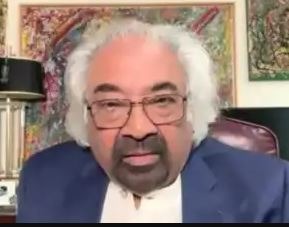I Feel at Home in Pakistan, No Need for India to Fight Our Neighbor”: Sam Pitroda Sparks Debate with Statement
Veteran technocrat and political thinker Sam Pitroda has once again grabbed headlines after his recent remarks on India–Pakistan relations. Claiming he feels “at home” in Pakistan, Pitroda urged Indians to rethink hostility with their neighbor, suggesting peace is the way forward. His statement has drawn mixed reactions across political and public circles, igniting conversations about diplomacy, identity, and regional stability.


By: Bharat Daily Samachar Date: 20 Sep,2025
A Call for Peaceful Coexistence
Pitroda emphasized the shared cultural, linguistic, and historical bonds between Indians and Pakistanis. According to him, the hostility sustained over decades has only drained resources and hampered regional growth. Instead of perpetuating conflict, he urged both governments to prioritize development, trade, and cultural exchange.
His underlying message is clear: South Asia cannot unlock its full potential unless India and Pakistan move beyond cycles of mistrust and violence. “The people on both sides want peace. It’s the politics that fuels hostility,” Pitroda said, reiterating that ordinary citizens in Pakistan welcomed him warmly whenever he visited, making him feel “at home.”
Political Ripples in India
The reaction to Pitroda’s comments has been far from uniform. Supporters of cross-border dialogue welcomed his call for peace, stating that fostering understanding is the only long-term solution to prevent endless clashes.
However, critics argue that such statements risk downplaying the seriousness of Pakistan’s role in cross-border terrorism and its historical conflicts with India. Some political leaders accused Pitroda of being “out of touch” with ground realities, while others suggested his words may be seen as insensitive to the sacrifices made by India’s armed forces.
The ruling party, in particular, used his remarks to question the stance of opposition leaders, linking Pitroda’s perspective to broader debates about national security and foreign policy.
India–Pakistan: A History of Complex Relations
The controversy highlights just how sensitive India–Pakistan relations remain. Since Partition in 1947, the two nations have fought multiple wars and continue to clash diplomatically over issues such as Kashmir, terrorism, and border disputes.
Despite this, there have been periods when people-to-people contact and cultural ties hinted at possibilities for reconciliation. Cricket matches, Bollywood films, and Sufi music have often acted as bridges between the two nations. Pitroda’s remarks appear rooted in this softer side of diplomacy, where cultural familiarity and human connection are stronger than political hostility.
Public Opinion: Divided Yet Thoughtful
Interestingly, the public response to Pitroda’s statement has been divided but not entirely dismissive. While some citizens took to social media to criticize him, others echoed his sentiment that constant enmity benefits no one.
A Delhi-based student wrote on X (formerly Twitter): “He is right. Both sides want jobs, education, and a better future. But politics keeps us fighting.”
Meanwhile, veterans and security analysts warned against idealism, stressing that peace cannot come without Pakistan addressing terrorism concerns. They argue that dialogue without accountability risks emboldening extremist elements.
The Bigger Question: Can India and Pakistan Truly Move Forward?
Pitroda’s remarks raise a larger question that often resurfaces in India–Pakistan debates—can the two neighbors ever truly move past their history? Advocates of peace argue that global examples like the European Union, where once-hostile nations now cooperate, show it is possible.
Skeptics, however, believe South Asia’s challenges are far deeper, requiring not just goodwill but concrete shifts in policy and accountability from both governments.
Why This Matters Now
The timing of Pitroda’s comments is also significant. With elections nearing and foreign policy becoming a heated subject in political campaigns, any remark on Pakistan tends to take center stage. His words have, therefore, not just sparked a debate on peace but also become part of India’s domestic political narrative.
For many Indians, the question is not whether Pitroda feels at home in Pakistan, but whether both nations can create conditions where their citizens feel secure and prosperous without hostility.
Conclusion: A Statement That Echoes Beyond Politics
Whether one agrees with Sam Pitroda or not, his statement has reignited conversations about what peace in South Asia could look like. On one side, it is a reminder of the shared roots and bonds that still exist; on the other, it highlights the tough realities of cross-border security concerns.
What remains undeniable is that the people of both India and Pakistan share aspirations for a better future. Pitroda’s words, however controversial, serve as a reminder that lasting peace cannot be built on weapons and wars alone—it requires empathy, dialogue, and the courage to imagine a different future.
